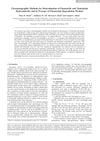 10 citations,
October 2010 in “International Journal of Andrology”
10 citations,
October 2010 in “International Journal of Andrology” Finasteride doesn't affect oral testosterone undecanoate, and high DHT levels may cause acne, prostate issues, and hair loss.
13 citations,
April 2019 in “International journal of molecular sciences” Acyzol could help treat conditions caused by zinc deficiency.
 16 citations,
December 2014 in “International Journal of Biological Markers”
16 citations,
December 2014 in “International Journal of Biological Markers” Longer CAG and GGN repeats increase alopecia risk, but no significant link to post-finasteride syndrome found.
 4 citations,
March 2019 in “Acta Chromatographica”
4 citations,
March 2019 in “Acta Chromatographica” Two methods can measure finasteride and tamsulosin hydrochloride; HPLC is more advantageous, while TLC offers better separation.
 1 citations,
December 2019 in “Current Medicinal Chemistry”
1 citations,
December 2019 in “Current Medicinal Chemistry” Anti-androgen drugs can help reduce OCD symptoms, but more large-scale trials are needed to confirm their effectiveness.
 2 citations,
February 2021 in “International Journal of Environmental Research and Public Health”
2 citations,
February 2021 in “International Journal of Environmental Research and Public Health” Women with PCOS tend to be less optimistic than those without it.
 July 2021 in “International Ophthalmology”
July 2021 in “International Ophthalmology” Female hair loss patients more likely to have dry eye and gland issues.
 3 citations,
September 2021 in “International Journal of Molecular Sciences”
3 citations,
September 2021 in “International Journal of Molecular Sciences” Androgens and a high-fat diet may increase the risk of severe COVID-19 in women with PCOS by upregulating certain proteins in the heart and kidneys.
 4 citations,
October 2018 in “International Braz J Urol”
4 citations,
October 2018 in “International Braz J Urol” Taking 5-alpha reductase inhibitors does not increase the risk of breast cancer in men.
February 2025 in “International Journal of Impotence Research”  June 2017 in “The Journal of Clinical Endocrinology and Metabolism”
June 2017 in “The Journal of Clinical Endocrinology and Metabolism” Finasteride's sexual side effects not caused by androgen deficiency or SRD5A inhibition.
 30 citations,
December 1999 in “International Journal of Dermatology”
30 citations,
December 1999 in “International Journal of Dermatology” Oral ivermectin effectively cured scabies with minimal side effects, and finasteride promoted hair growth in men with hair loss.
 December 2024 in “International Journal of Drug Delivery Technology”
December 2024 in “International Journal of Drug Delivery Technology” The new delivery method for dutasteride is more effective and has fewer side effects.
June 2023 in “Journal of personalized medicine” Androgen treatment with dihydrotestosterone may help maintain height in patients with 5-α-reductase type 2 deficiency, especially before puberty.
 10 citations,
August 2020 in “International Journal of Andrology”
10 citations,
August 2020 in “International Journal of Andrology” 5α-reductase inhibitors like finasteride may not be effective or safe for transgender individuals, and more research is needed.
 58 citations,
November 2020 in “International Journal of Molecular Sciences”
58 citations,
November 2020 in “International Journal of Molecular Sciences” SHBG may be a useful early indicator and treatment target for PCOS.
 50 citations,
September 2016 in “The Journal of Clinical Endocrinology and Metabolism”
50 citations,
September 2016 in “The Journal of Clinical Endocrinology and Metabolism” Finasteride for hair loss may cause persistent sexual symptoms, depression, anxiety, and lower quality of life.
 May 2024 in “International Journal of Nanomedicine”
May 2024 in “International Journal of Nanomedicine” Biodegradable polymers can improve cannabinoid delivery but need more clinical trials.
 February 2024 in “International Journal of Molecular Sciences”
February 2024 in “International Journal of Molecular Sciences” Hair loss in Androgenetic Alopecia is caused by genetics, aging, and lifestyle, leading to hair follicle shrinkage and related health risks.
 23 citations,
January 2019 in “International Journal of Dermatology”
23 citations,
January 2019 in “International Journal of Dermatology” Finasteride improves hair growth and reduces hirsutism in women, but side effects and optimal dosages need further research.
 42 citations,
August 2013 in “International Journal of Women's Health”
42 citations,
August 2013 in “International Journal of Women's Health” Female pattern hair loss is caused by multiple factors and while treatments like topical minoxidil, hormone therapy, and low-level light therapy can help, none can fully cure it.

Finasteride is popular for treating male hair loss but may increase the risk of serious prostate cancer and has other potential side effects.
 38 citations,
January 2019 in “International Journal of Women's Dermatology”
38 citations,
January 2019 in “International Journal of Women's Dermatology” The document concluded that more research is needed to find the best treatment for Frontal fibrosing alopecia.
 7 citations,
May 2012 in “International Journal of Andrology”
7 citations,
May 2012 in “International Journal of Andrology” The new oral testosterone pill normalized testosterone levels and lowered SHBG in men with low testosterone.
 7 citations,
August 2023 in “EClinicalMedicine”
7 citations,
August 2023 in “EClinicalMedicine” Anti-androgens can help manage some PCOS symptoms better than metformin but are not more effective than placebos or birth control pills for other symptoms.
 April 2022 in “Diabetes Therapy”
April 2022 in “Diabetes Therapy” Low testosterone does not prevent prostate cancer in men with type 1 diabetes.
 1 citations,
July 2020 in “International journal of radiology & radiation therapy”
1 citations,
July 2020 in “International journal of radiology & radiation therapy” Partial hair-sparing brain radiotherapy is possible and doesn't affect cancer control but still causes noticeable hair loss.
 14 citations,
January 2020 in “International Journal of Biological Sciences”
14 citations,
January 2020 in “International Journal of Biological Sciences” Ranitidine and finasteride lower TMAO levels, reducing heart and kidney damage by changing gut bacteria.
 7 citations,
July 2019 in “Scientific Reports”
7 citations,
July 2019 in “Scientific Reports” Finasteride helps reduce heart enlargement in heart failure patients.
 September 2023 in “International journal of medicine”
September 2023 in “International journal of medicine” AI is revolutionizing healthcare by improving diagnosis, treatment, and monitoring, but still needs close supervision.


























